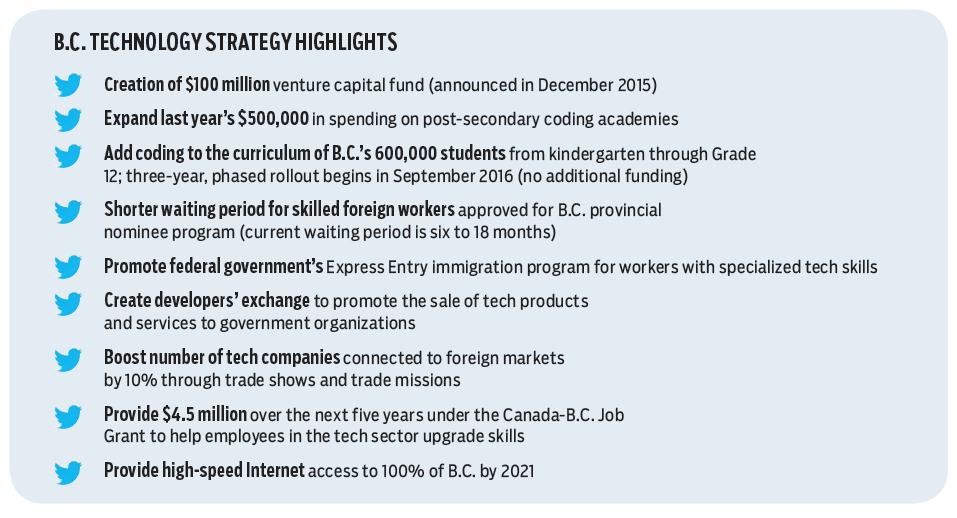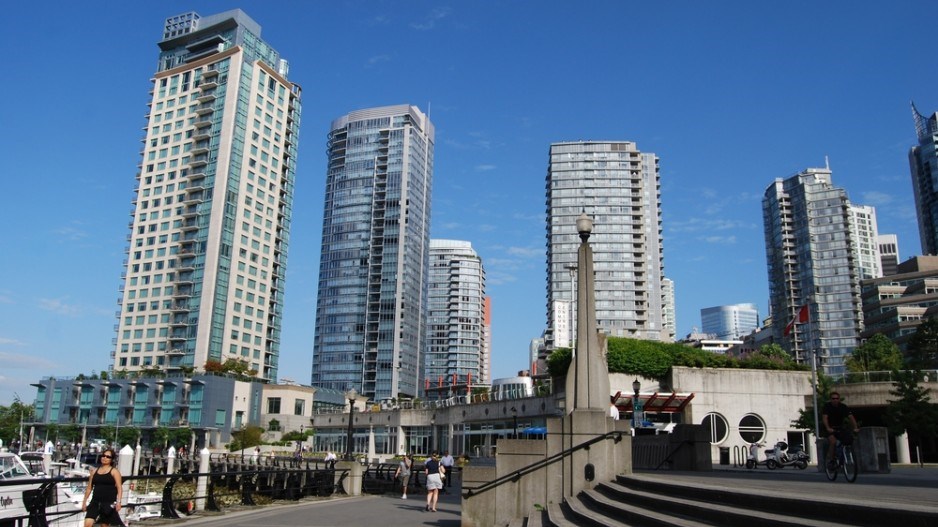B.C.'s provincial government unveiled its technology strategy last week. Other levels of government have different spheres of influences when it comes to guiding economic develop. Business In Vancouver compares tech strategies throughout the region and in Ottawa.

Vancouver
Vancouver did not have a tech-sector development manager when it released its most recent economic action strategy in 2011, calling for further development of tech incubators/accelerators, a focus on green technologies and efforts to attract high-level talent to Vancouver.
“We’ve refocused our technology strategy and efforts on a singular goal of positioning Vancouver as a top global ecosystem for growing technology companies and attracting smart capital,” said Sean Elbe, who was hired three and a half years ago as the Vancouver Economic Commission’s (VEC) tech-sector development manager.
“So often top tech talent thinks that they need to leave Canada to build their career in tech, and that’s simply not the case.”
The VEC partnered with Microsoft (Nasdaq:MSFT) and the BC Innovation Council in 2015 on a communications campaign aimed at marketing Vancouver as a place for talent to build careers in the tech sector.
The VEC also supports job fairs and is partnering with the Business Development Bank of Canada’s BDC Capital division and the Ewing Marion Kauffman Foundation on an investor education program for venture capitalists.
Finance Minister Bill Morneau asked the VEC to bring together the city’s tech leaders on January 15 for pre-budget consultations.
“He said it was the most optimistic group he had engaged with,” Elbe said. “What we recognized quite a while ago was that Vancouver’s economy has already transformed into a knowledge-based economy. And that’s something we’re really excited about the province participating in and the federal government.”
Burnaby
Burnaby’s overall economic development strategy includes separate focuses on companies involved with the information technology, communications and wireless sectors, life sciences and environmental technologies.
The strategy, last updated in 2007, calls for the city to work with post-secondary institutions such as the British Columbia Institute of Technology (BCIT) and Simon Fraser University (SFU) to keep tech-oriented students working in Burnaby after they graduate.
The city is already home to significant employers such as Fortinet (Nasdaq:FTNT), Ballard (TSX:BLD), PMC-Sierra (Nasdaq:PMCS) and EA Canada.
“The combination in Burnaby of SFU, BCIT and leading international players in the information sector simply ought to provide the potential for more interaction and more exciting prospects,” strategy documents state. “The city should challenge itself and these groups to do more with these raw ingredients.”
Mayor Derek Corrigan has a notoriously prickly relationship with TransLink, but the strategy calls for working with the transit service to make commuting easier for tech workers.
Richmond
The City of Richmond does not have a dedicated technology strategy. Instead, it broadly applies the same business development policies from its resilient economy strategy.
“Our overall support of all sectors of the economy circles around retaining our current businesses, growing them and attracting new ones,” said Neonila Lilova, the city’s economic development manager.
However, Richmond has also launched initiatives that focus exclusively on technology, including last October’s adoption of a $5.5 million digital strategy that includes offering free Wi-Fi at all community centres and around-the-clock online access to business licensing services.
And in 2015, the city launched Metro Vancouver’s first local carbon marketplace program that provides subsidies to companies implementing sustainable technologies.
A 2014 report from the City of Richmond found that while technology is an important contributor to the economy, it’s “proportionally smaller than in the rest of Metro Vancouver.”
According to that same report, just 5% of the city’s 110,000 jobs are in the tech sector. Community-oriented jobs account for 40%, while transportation, warehousing and logistics jobs account for 14%.
Federal government
The federal Liberals pledged during the fall election campaign to invest $200 million annually in working with corporations to deploy clean technologies throughout the resources sector. That comes on top of a separate promise of a $100 million annual investment in clean-tech innovators.
The Liberals also said they would contribute $200 million to the expansion startup incubators and accelerators.
In mid-January, Prime Minister Justin Trudeau announced $12 million in funding for the research and promotion of water technologies. And during a visit that same month to Google Canada’s new head offices in Kitchener, Ontario, Trudeau told reporters he was “halfway decent as a coder.”
Despite the fact the selfdescribed “geek prime minister” has showed interest in developing Canada’s knowledge-based economy, the tech community has criticized a campaign promise to cap the amount employees can claim through stock-option deductions.
Many in the tech sector say it would make it more difficult to attract top talent, and B.C. Premier Christy Clark told reporters during the BC Tech Summit on January 19 that the proposal “would be terrible for the tech community in Canada.”




